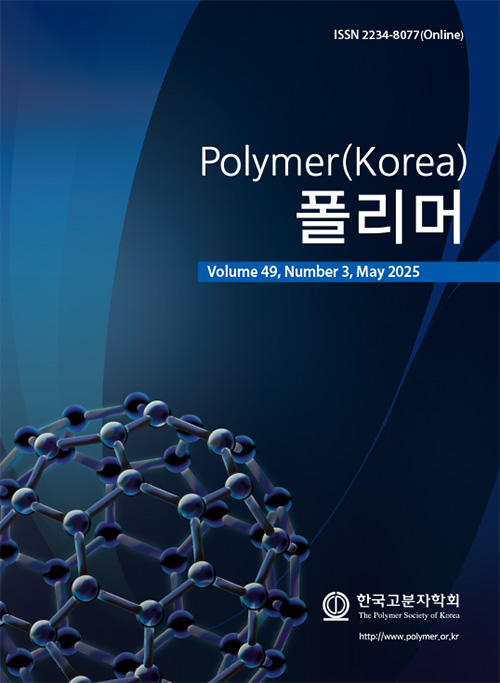- Study on Mechanical and Thermal Properties of Polypropylene-based Composites with Crushed Phenolic Resin Waste and Compatibilizer
Se Jun Yang*, **, In Gyu Choi*, **, Tae Min Lee*, **, Jin Woo Bae*, **,†
 , and Byeong Uk Nam*,†
, and Byeong Uk Nam*,† 
*Department of Chemical and Biological Engineering, Korea University of Technology and Education, 1600, Chunjeol-ro, Byeongcheon-myeon, Dongnam-gu, Cheonan-si, Chungcheongnam-do, 31253, Korea
**Future Convergence Engineering, Korea University of Technology and Education, 1600, Chunjeol-ro, Byeongcheon-myeon, Dongnam-gu, Cheonan-si, Chungcheongnam-do, 31253, Korea- 분쇄된 폐페놀수지와 상용화제를 도입한 폴리프로필렌 기반 복합소재의 열적 및 기계적 물성 연구
*한국기술교육대학교 화학생명공학전공, **한국기술교육대학교 미래융합공학전공
Reproduction, stored in a retrieval system, or transmitted in any form of any part of this publication is permitted only by written permission from the Polymer Society of Korea.
Phenolic resin is a thermosetting resin, which has excellent heat resistance and mechanical properties, but it is difficult to recycle after use due to its thermosetting properties. In this study, in order to recycle phenolic resin waste (PRW), crushed phenolic resin waste (CPRW) was used as a filler and compounded with polypropylene (PP) to prepare PP/CPRW composites. In order to improve the low compatibility of phenolic resin and PP in the PP/CPRW composite, maleic anhydride grafted polypropylene (MAPP), a compatibilizer, was introduced. The mechanical and thermal properties of PP/CPRW composites were improved with the introduction of MAPP and an increase in its content compared to those without MAPP. The tensile strength and flexural modulus of PP/CPRW composites were increased with the addition of sufficient amount of compatibilizer, and the reduction of impact strength was improved, which improved the overall mechanical properties. In addition, the crystallization temperature and thermal decomposition temperature of the composites with the addition of compatibilizer were analyzed to confirm that the crystallization rate and heat resistance were improved. FTIR and SEM analyses of the physical properties of PP/CPRW composites due to the addition of compatibilizer showed that the addition of MAPP compatibilizer improved the compatibility of CPRW in the PP matrix due to hydrogen bonding interactions with CPRW, which improved the interfacial adhesion and improved dispersion, resulting in increased thermal and mechanical properties.
페놀수지는 열경화성 수지로서 우수한 내열성과 기계적 물성을 가지고 있지만 열경화 특성으로 인해 사용 후 재활용이 어렵다. 본 연구에서는 폐페놀수지(phenolic resin waste, PRW)를 재활용하기 위해서 이를 분쇄(crushed phenolic resin waste, CPRW)하고 필러로 사용해 폴리프로필렌(polypropylene, PP)과 함께 컴파운딩하여 PP/CPRW복합소재를 제조하였다. 이렇게 제조된 PP/CPRW 복합소재에서 페놀수지와 PP의 낮은 상용성을 개선하기 위해 상용화제인 maleic anhydride grafted polypropylene(MAPP)를 도입하였다. PP/CPRW 복합소재는 상용화제가 도입되지 않은 경우보다, 상용화제가 도입되고 그 함량이 증가함에 따라 기계적 물성과 열적 특성이 향상되었다. PP/CPRW 복합소재에 상용화제가 충분히 도입됨에 따라 인장강도와 굴곡탄성률이 증가하였고, 충격강도의 감소가 개선되어 전반적인 기계적 물성이 향상됨을 확인하였다. 또한 상용화제 첨가에 의한 복합소재의 결정화 온도와 열분해 온도를 분석하여 결정화 속도와 내열성이 개선됨을 확인하였다. 상용화제 첨가에 따른 PP/CPRW 복합소재의 물성 개선 원인을 FTIR과 SEM으로 분석한 결과, MAPP 상용화제 첨가로 CPRW와의 수소결합 상호작용으로 PP 매트릭스 내에서 CPRW의 상용성이 개선되었고, 이로 인해 계면 접착력이 향상되고 분산성이 개선되어 열적 및 기계적 물성이 증가한 것을 확인하였다.
Keywords: phenol resin waste, recycling, polypropylene, compatibilizer, composite, maleic anhydride grafted polypropylene.
- Polymer(Korea) 폴리머
- Frequency : Bimonthly(odd)
ISSN 2234-8077(Online)
Abbr. Polym. Korea - 2024 Impact Factor : 0.6
- Indexed in SCIE
 This Article
This Article
-
2025; 49(3): 317-324
Published online May 25, 2025
- 10.7317/pk.2025.49.3.317
- Received on Nov 20, 2024
- Revised on Dec 20, 2024
- Accepted on Jan 8, 2025
 Correspondence to
Correspondence to
- Jin Woo Bae*, ** , and Byeong Uk Nam*
-
*Department of Chemical and Biological Engineering, Korea University of Technology and Education, 1600, Chunjeol-ro, Byeongcheon-myeon, Dongnam-gu, Cheonan-si, Chungcheongnam-do, 31253, Korea
**Future Convergence Engineering, Korea University of Technology and Education, 1600, Chunjeol-ro, Byeongcheon-myeon, Dongnam-gu, Cheonan-si, Chungcheongnam-do, 31253, Korea - E-mail: jwbae@koreatech.ac.kr, bunam@koreatech.ac.kr








 Copyright(c) The Polymer Society of Korea. All right reserved.
Copyright(c) The Polymer Society of Korea. All right reserved.